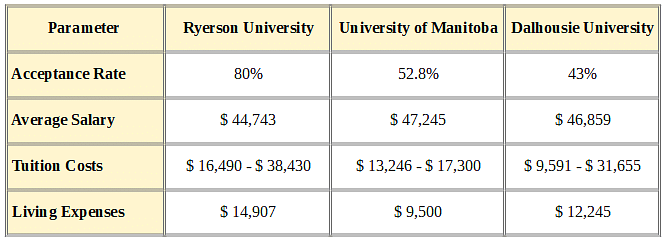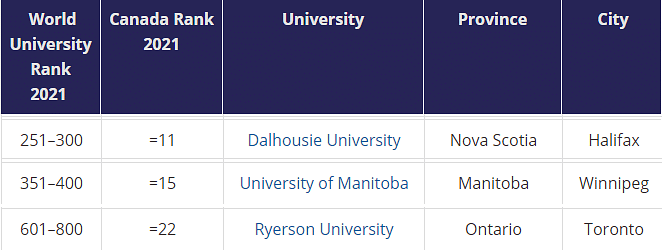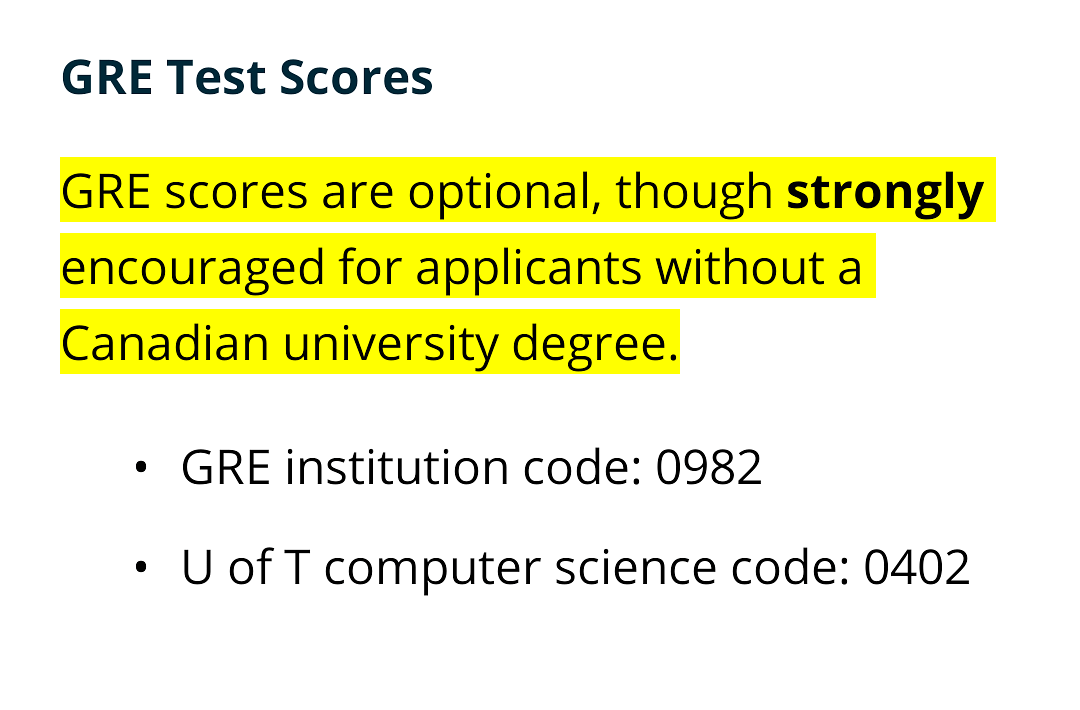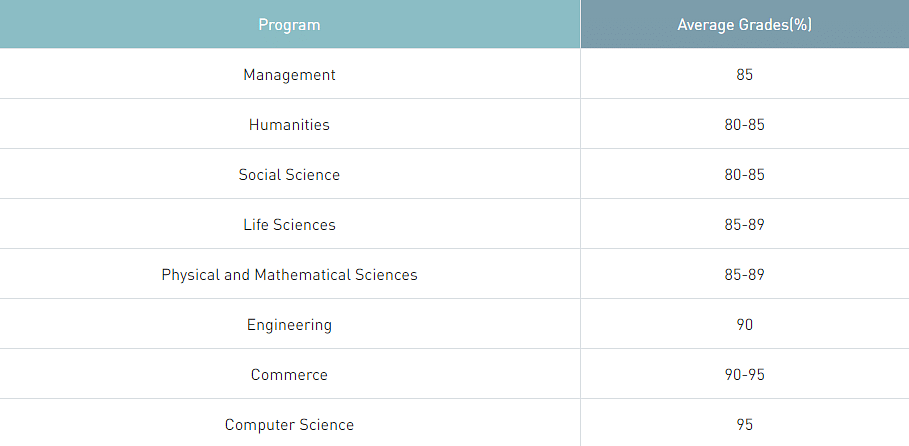Get Answers on Test Preparation, Admissions & Campus Life
Study Abroad Countries
What percentage is required for an Indian student to get an easy admission to the University of Waterloo?
Since Waterloo is one of Canada's as well as world's best universities, there is no easy way getting admitted here. Waterloo’s admission averages range from low 80s to mid-90s. These can vary depending on the number of applications received as well as the number of spaces available in each program. You should already assume that the grades of students who apply will be generally very good. Your requirements will also differ with your nationality or where you’ve studied previously. But most importantly, you should know that grades alone won’t get you inside Waterloo as they take a good look at many other things. Thus, there are some aspects to work on if you're an Indian student wishing to study here:
- Grades: At Least a minimum of 90% in grade 10 and grade 12 exams. (High school and Intermediate)
- First or Second Division standing in one of the following.
- All India Senior School Certificate awarded by CBSE.
- Indian School Certificate awarded by CISCE.
- Other pre-university certificate awarded after 12 years of academic studies.
- English proficiency: Very important to have an IELTS score of 6.5 or TOEFL iBT score of 90.
- Admission Information Form: You will need to write an exceptional AIF. This questionnaire gives you a great chance to display everything about you that makes you unique. You can share your extracurricular activities, work experience, volunteering activities and other initiatives.
- Euclid Mathematics Contest: Strongly recommended to write the Euclid Mathematics Contest and/or the Canadian Senior Mathematics Contest. Results of the contests will be used in scholarship decisions and possibly admission decisions for programs in the Faculty of Mathematics.
- Additional Factors: An online video interview may be needed, which allows the university to virtually meet you and get a sense of who you are and get a better idea of you.
These are the general requirements. Please note that some programs will have different criteria depending on the competition, degree type and program specification. There will not be one way to prepare for your application as the university looks at your whole profile and then takes a decision.
Will I get accepted into University of Toronto?
Securing admission at University of Toronto is really difficult. You will find it very competitive which is fair- it’s currently ranked at #29 among world universities by QS. The overall acceptance rate of the University is 43% but things are harder if you are an international student. There will be a lot of extra formalities like English proficiency, LORs, funding abilities that the university will consider. This is around 23.1%
Factors to be considered:
GPA requirements:
For admission in undergraduate programs, an average score of 90 in class 12th can be considered competitive. Expected scores for some courses are mentioned below:
In case of graduate program admission, the minimum GPA requirement is 3.0 while 3.4 out of 4.0 is considered as a competitive score.
English language proficiency:
TOEFL or IELTS scores are accepted and It is mandatory for international students to submit one of these test scores.
- TOEFL score: 93(iBT)
- IELTS score : 7.0 with no band below 6.0
GRE score:
Few courses demand GRE test scores for the admission process whereas Courses like CS , material science have made it optional, however submitting a GRE with a score around 320+ will definitely create an edge to your profile which may enhance your chances of selection.
GMAT:
Minimum GMAT score of 570 is demanded for admission in MBA courses at University of Toronto while the average score of the University is 665.
Other requirements:
Minimum 3 letters of recommendations along with good resume and Participation in Co-Curricular activities are expected.
If you fulfill all the above mentioned criteria including good grades, standard test scores and LORs you will be good to go. Ultimately it depends on the competition in the course which you are inclined towards.
What is the average GRE for people getting into MSCS of University of Waterloo?
While GRE is an important factor in MS Computer Science admissions at Cheriton School of Computer Science, there is not a defined cut off. This is because the University of Waterloo accepts or rejects a candidate on the basis of their overall profile. So you should simply not rely only on your strong GRE score as this doesn’t guarantee you admission. This being said, a high GPA, strong academic background with a good GRE score increases your chances of getting admitted.
On an average, it will not be wrong to claim that 75th GRE score percentile is a good GRE score. In simpler words, 161 or higher in GRE quant and 157 or higher in GRE verbal will be a good score. Lower than this will make enrollment in a top University like Waterloo much difficult.
The score of GRE quant and GRE verbal contributes towards the overall GRE score, so it recommended to aim for 75 percentile or higher in quant and 60+ percentile in verbal. The competition will be higher since this is a very sought-after subject. If you're from India then the competition is even higher as there are so many talented students applying.
So assuming your high GPA, it's better if you do better in Quant as compared to Verbal. This is because the subject of computer science is more oriented towards quant.
Which Canadian university is better for a foundation course, Ryerson University, University of Manitoba or Dalhousie University?
While all these have their own perks, it's a given to prefer Dalhousie over Ryerson and Manitoba. QS Graduate Employability Rankings 2020 has ranked only Dalhousie University at #301-500. Ryerson is your best choice if you're planning to live in a big city- while the others are situated in small towns. Still, all three have pretty similar foundation courses and ultimately depends on how seriously you take it.
Ryerson University is known for many leading programs like Journalism, Sports Media, Arts, Communication and Design, Community Services, Engineering, and Business; there are some specialised programs only for international students with the Ryerson ESL Foundation Program. It has 62 undergraduate programs and 49 minor technical programs.

The University of Manitoba is one of the oldest medical-doctoral research universities known for its professional schools like law, engineering, business, medicine, dentistry, architecture which has a total of 108 different degrees, diplomas, and certificates.

Dalhousie University is known for many leading programs like Arts & Humanities, Clinical, pre-clinical & health, Engineering & Technology, Life sciences, Physical sciences, Social sciences, and Business & Economics. It has 120 undergraduate programs, and 80+ postgraduate and doctorate programs.Ryerson University has been ranked #601-800, the University of Manitoba has been ranked #351-400, and Dalhousie University has been ranked #251-300 by The Times Higher Education World University Rankings 2021.
All these three universities have a good placement with 86.7% Employment rate of Ryerson University, 83% for the University of Manitoba, and 84% for Dalhousie University.
In what ways can McGill University surpass the reputation of the University of Toronto?
Both McGill University and the University of Toronto are widely reputed. If you have to choose between these, make a choice based on the subject and the department you are interested in.
Don’t put too much emphasis on the university rankings. It changes each year. Here is a brief comparison of the two. Currently, McGill University world ranking is #44 (THE World University Ranking). While University of Toronto is ranked #18 by THE World University Ranking.
Here is a brief comparison of these two.
| Parameters | McGill University | University of Toronto |
| Tuition fees (undergraduate) | 29,200 CAD (International students) | 45,690 CAD (International students) |
| Acceptance rate | 48.9% | 43% |
| Popular courses | Medical and Health Science, Computer Science, Social Science & Humanities | Psychology, Medical Technology, Automation and Control, Human and Biological Sciences |
| Average salary | CAD 62k | CAD 68k |
You can’t go wrong with either of these schools.
Does the University of Toronto require a GRE for a MS in computer science?
Short answer, yes. It won’t hurt your case unless the score is too bad but the Computer science department website of University of Toronto states that there is no requirement of GRE test score for the admission process. Submitting IELTS or TOEFL scores will suffice the process of admission for international students. The online application form does provide a field where you can submit your GRE scores, but it is made optional.
However it is recommended to upload a GRE score as it will create an edge over other applicants. Target for a safe score of 320+ in GRE so that you leave no stone unturned to create a good impression.
Tabulation below gives a brief overview on expected test scores of University of Toronto:

When you are applying for such competitive programs, it's always wise to present yourself in the best way possible by keeping your best foot ahead.

Submitting a GRE score along with a good GPA and resume will definitely enhance the chances of your selection.
Is Carleton or Concordia University better for MEng in mechanical engineering?
Both Carleton and Concordia are top public universities of Canada, securing #301/400 and #201/400 rank in the domain of mechanical engineering by Academic Ranking of Universities Ranking (ARWU) 2020.
However, the program duration in both universities differs, the MEng program at Concordia University is 2 years whereas at Carleton University it's 1 year. Here’s a brief comparison of the MEng program in both universities:
| PARAMETERS | Concordia University | Carleton University |
| RANK | # 201/400 | #301/400 |
| ACCEPTANCE RATE | 61.80% | 20% - 30% |
| FEES CHARGED | $22676 For 2 years. | $23740 for 1 year |
| LIVING EXPENSES | $16,0681 | $13,354 |
| AVERAGE PACKAGE | $46,475 | $61,860 |
Concordia University students receive easy access to state of the art laboratories and research centers for a good grip and better understanding of Industrial Control, on the other hand, Carleton's MEng program focuses on building student's engineering career by the combined rigorous program along with a supportive learning environment and hands-on experience training.
Placements
On the completion of the program, Concordia students get placed as Mechanical Engineers, Aerospace Engineers with an average package of $46,475 whereas Clareton students receive job opportunities as Robotic Engineer, Nanotech Engineer, etc with a median package of $61860.
Which is the best university to study Computer Science if I have letters from these universities: University of Manitoba, Concordia University, or University of Regina?
University of Manitoba Computer Science faculty is great. It has good research faculties in Artificial Intelligence, Cryptography, and Human-Computer Interaction. The university was ranked #301-350 by THE 2022. Here are the highlights of the Bachelor of Computer Science Honours.
| Course fee | INR 12,26,214 |
| Other fees | INR 9,11,176 |
| TOFEL, PTE, IELTS scores | TOFEL - 86/120, PTE - 58/90, IELTS - 6.5/9 |
| Median CTC after 2 years of graduation | INR 5,013,498 |
After graduation, you can get lucrative careers in special effects to robotics, in almost every area imaginable.
Concordia University is also a good option. Montreal houses many major video game studios, and AI companies. So, it will be easier to get internships and placements.
Is Seneca College better than Centennial?
The infrastructure of Centennial is top class. I know this because I have studied in that college. Centennial offers some really good Engineering and IT courses. Both the colleges are at par for Arts. The location of Seneca, the North York region, is rapidly growing. This makes Seneca a better option for Management courses because of its rich networking opportunities.
Both the colleges have their own strengths and weaknesses, and none of them is better or worse than the other.
Which university should one select in Canada for graduate studies from the following two, University of Windsor or Dalhousie University?
Ranking wise Dalhousie University is good and the Job opportunity-wise University of Windsor is better, Halifax has more part-time job opportunities and fewer full-time jobs and the pay scale is lower and the tax is higher. As an international student, you might face difficulty with tuition and funding. At Halifax you will get plenty of parttime jobs. Since Halifax is also larger than Windsor, you will have more options.

Both universities have good placement with an 85.91% Employment rate of the University of Windsor and 84% Employment rate of Dalhousie University.
The University of Windsor is known for many leading programs like Arts, Humanities, and Social Sciences, Education, Engineering, Graduate Studies, Human Kinetics, Law, Nursing, Business, and Science whereas Dalhousie University is known for its programs like Arts & Humanities, Clinical, pre-clinical & health, Engineering & Technology, Life sciences, Physical sciences, Social sciences, and Business & Economics.
QS Graduate Employability Rankings 2020 has ranked only Dalhousie University at #301-500. Selecting a university depends upon your priority. If you want to get a good education go for Dalhousie University but to get settled early in Canada go for Windsor University. Overall Dalhousie University is the potential choice as you can always move to Ontario if you don't find any job in Nova Scotia.




